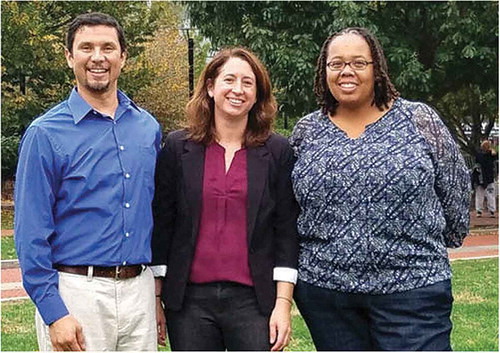When we explore what it means to be middle grades educators who are also agents of transformation there is much to consider. For example, engaging in social justice work requires the acknowledgement that equity frameworks such as culturally relevant pedagogy (Ladson-Billings, Citation1995; Ladson-Billings, Citation2014), cultural responsiveness (Gay, Citation2000), culturally sustaining pedagogy (Paris, Citation2012: Paris & Alim, Citation2017), equity literacy (Gorski, Citation2017) and reality pedagogy (Emdin, Citation2011, Citation2016) are not just lists of practices or strategies, but philosophies or ways of being and thinking. There is no list of silver-bullet strategies that make us equitable, transformative educators or that make our curriculum socially just. As the articles presented in this issue describe, equity-centered educators need to focus on developing their own equity mindset in addition to developing a curriculum centered in social justice themes.
As such, becoming a culturally sustaining or equity literate educator is an ongoing, transformative process that requires educators to examine their own positionality, become aware of their own cultural blind spots, understand the cultural characteristics and contributions of marginalized groups, and actively and persistently identify who ends up privileged and who ends up marginalized by the theories and practices they use. This includes revisiting some of the principles that guide our work as middle level educators. As Vagle (Citation2012) stated:
although stage developmentalism has brought attention to the needs of [students] in the name of developmental responsiveness, it also has proceeded without careful enough consideration of critical theoretical perspectives regarding issues related to power, interest, agency, gender, race, class, culture and so on. (p. 1)
So, while we need to celebrate and be responsive to the unique characteristics of early adolescence, we cannot do so without recognizing and celebrating the unique identities and lived experiences of every young adolescent who enters our schools. When we do, we are recognizing that our job as middle grades educators is to empower each student to transform themselves. Such empowerment has the potential for youth to become critically conscious, which in turn supports their development as producers of knowledge and transformers of society.
The three articles we present in this issue carry these important notions of what it means to be a transformative educator throughout. Within this issue, Andrews, Moulton, and Hughes remind us that the hard work of becoming transformative, equity-based educators must begin before we even enter the middle grades classroom or begin our work with young adolescents. Whether a beginning or veteran teacher, the strategies described in this chapter can help all educators reconsider the ways they think about identity, bias, and privilege in the classroom. Coffey and Fulton, and Hagerman and Porath’s articles both share concrete strategies for implementing social justice based curricular practices utilizing personalization and service-learning respectively.
We argue that every middle grades educator should be a transformative equity leader within their respective schools. According to Gorski (Citation2017), equity leaders must:
“be vocal and visual in [their] equity advocacy” (p. 164) .
consider how people who vocally fight for equity in your building or district are treated.
not let deficit views, including a focus on grit or growth mindset, go unchallenged.
consider how to mitigate the affects of inequitable policies that you cannot change.
prioritize the needs of students and families with marginalized identities (privilege begets privilege).
In becoming transformative, equity-based educators, we must remain open to the fact that transformation does not occur overnight. It takes time and the passing of time always requires a reexamination of our dispositions, practices, and ways of thinking and being. We also must keep in mind that self-examination does not come easily to most people. Peeling back the layers on one’s actions can be uncomfortable, even painful. But self-examination is necessary if we wish to truly transform our teaching practices and ourselves.
References
- Emdin, C. (2011). Moving beyond the boat without a paddle: Reality pedagogy, Black youth, and urban science education. Journal of Negro Education, 80(3), 284–295.
- Emdin, C. (2016). For White folks who teach in the hood… and the rest of Y’all too: Reality pedagogy in urban education. Boston, MA: Beacon Press.
- Gay, G. (2000). Culturally responsive teaching: Theory, research, and practice. New York, NY: Teachers College Press.
- Gorski, P. C. (2017). Reaching and teaching students in poverty: Strategies for erasing the opportunity gap. New York, NY: Teachers College Press.
- Ladson-Billings, G. (1995). Toward a theory of culturally relevant pedagogy. American Educational Research Journal, 32(3), 465–491. doi:10.3102/00028312032003465
- Ladson-Billings, G. (2014). Culturally relevant pedagogy 2.0: A.K.A. the remix. Harvard Educational Review, 84(1), 74–84. doi:10.17763/haer.84.1.p2rj131485484751
- Paris, D. (2012). Culturally sustaining pedagogy: A needed change in stance, terminology, and practice. Educational Researcher, 41(3), 93–97. doi:10.3102/0013189X12441244
- Paris, D., & Alim, H. S. (Eds.). (2017). Culturally sustaining pedagogies: Teaching and learning for justice in a changing world. New York, NY: Teachers College Press.
- Vagle, M. D. (2012). Introduction: Being a bit disruptive. In M. D. Vagle (Ed.), Not a stage! A critical re-conception of young adolescent education (pp. 1–9). New York, NY: Peter Lang.

